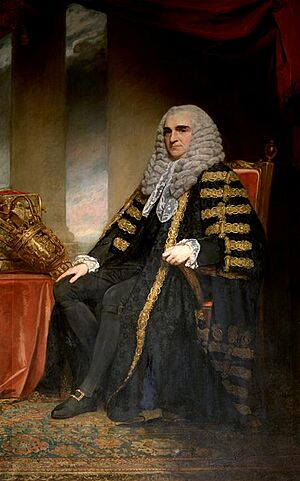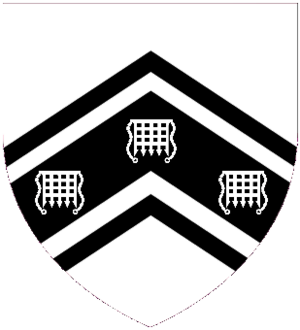Edward Thurlow, 1st Baron Thurlow facts for kids
Quick facts for kids
The Lord Thurlow
|
|
|---|---|
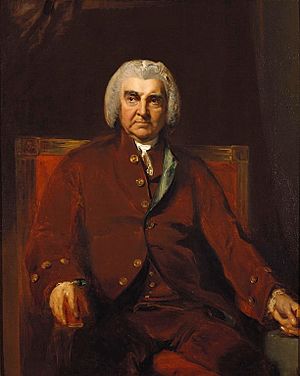
Portrait by Thomas Lawrence
|
|
| Lord High Chancellor of Great Britain Lord High Steward for the trial of Warren Hastings |
|
| In office 3 June 1778 – 7 April 1783 |
|
| Monarch | George III |
| Prime Minister | |
| Preceded by | The Earl Bathurst |
| Succeeded by | In Commission |
| In office 23 December 1783 – 15 June 1792 |
|
| Monarch | George III |
| Prime Minister | William Pitt the Younger |
| Preceded by | In Commission |
| Succeeded by | In Commission |
| Member of Parliament for Tamworth |
|
| In office 1765–1778 |
|
| Preceded by | Viscount Villiers |
| Succeeded by | Anthony Chamier |
| Personal details | |
| Born | 9 December 1731 |
| Died | 12 September 1806 (aged 74) |
| Nationality | English |
| Political party | Tories |
Edward Thurlow, 1st Baron Thurlow (born December 9, 1731 – died September 12, 1806) was an important British lawyer and politician. He was a member of the Tory party. He served in the House of Commons (a part of the British Parliament) from 1765 to 1778. After that, he became a Baron, which is a noble title. He was also the Lord High Chancellor of Great Britain for 14 years. This was a very powerful legal and political job, and he worked under four different Prime Ministers.
Early Life and Education
Edward Thurlow was born in a place called Bracon Ash in Norfolk, England. He was the oldest son of Reverend Thomas Thurlow. His younger brother, also named Thomas Thurlow, later became a bishop.
Edward went to school at King's School, Canterbury. Then he studied at Caius College, Cambridge, which is a famous university. However, he had to leave Cambridge in 1751 without finishing his degree. This happened because he had some disagreements with the university leaders.
After leaving Cambridge, he trained to be a lawyer. In 1754, he officially became a lawyer. At first, his career was slow. But over time, he became a very successful lawyer. In 1761, he was named a King's Counsel. This meant he was a special lawyer who advised the King.
Political Career
Thurlow decided to enter politics. In 1768, he was elected as a Member of Parliament for Tamworth. He was a member of the Tory party.
Two years later, he became the Solicitor-General. This is a senior legal advisor to the government. He held this job until 1772. Then, he was promoted to Attorney General, which is an even higher legal position. He stayed in this role for six years. During this time, he was known for strongly opposing the American colonies' fight for independence.
In 1778, Thurlow became a member of the Privy Council. This is a group of advisors to the King. He was also given the noble title of Baron Thurlow. He then became the Lord Chancellor, a very important role in the government and legal system. He started this job on July 14, 1778.
As Lord Chancellor, he disagreed with some ideas for economic and government changes. The government he was part of, led by Lord North, ended in 1782. But Thurlow managed to keep his job as Lord Chancellor even when new Prime Ministers took over.
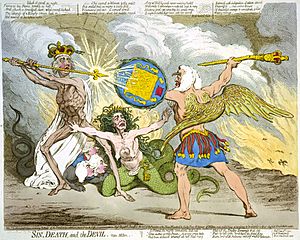
In 1783, a new government was formed, and Thurlow was not asked to be Lord Chancellor again. So, he joined the group that opposed the government. He helped bring down that government in December 1783.
When William Pitt the Younger became Prime Minister, he made Thurlow Lord Chancellor again. However, Pitt and Thurlow often had disagreements. Thurlow often relied on his friendship with King George III to stay in power. He also supported Warren Hastings, a British official who was on trial at the time.
In 1792, Thurlow criticized a new law proposed by Pitt. Because of this, he was finally removed from his position as Lord Chancellor.
Later Life
Even though he was dismissed, Thurlow was given another noble title as Baron Thurlow. This new title was set up so that his nephews could inherit it after him. He never held a government job again and retired from public life.
His last recorded appearance in the House of Lords was in 1802.
Family
Lord Thurlow never married. However, he had three daughters. Two of his daughters, Maria and Catharine, had their portraits painted by a famous artist named George Romney in 1783.
- Maria passed away in 1816. She married Colonel Sir David Cunynghame in 1801 and had children.
- Catharine passed away in 1826. She married Lord Saltoun in 1815.
Death
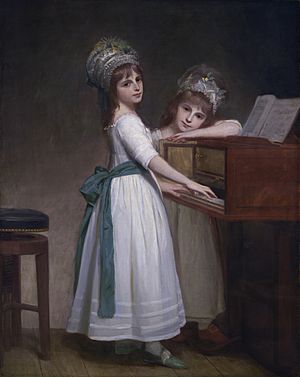
Edward Thurlow died in Brighton on September 12, 1806, when he was 76 years old. He was buried in the Temple Church.
The noble title he received in 1778 ended when he died because he had no sons to inherit it. However, the second title he received in 1792 was passed on to his nephew, Edward, who was the son of his brother, Thomas Thurlow.
See also
- Honora Jenkins' will
 | Mary Eliza Mahoney |
 | Susie King Taylor |
 | Ida Gray |
 | Eliza Ann Grier |


